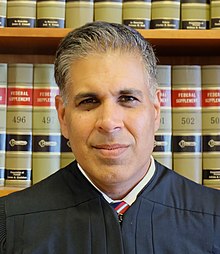Forsyth County, Georgia v. The Nationalist Movement, 505 U.S. 123 (1992), was a case in which the United States Supreme Court limited the ability of local governments to charge fees for the use of public places for private activities. By a 5–4 vote, the court ruled that an ordinance allowing the local government to set varying fees for different events violated the First Amendment due to the lack of "narrowly drawn, reasonable, and definite standards" governing the amount of the fee.
Hill v. McDonough, 547 U.S. 573 (2006), was a United States Supreme Court case challenging the use of lethal injection as a form of execution in the state of Florida. The Court ruled unanimously that a challenge to the method of execution as violating the Eighth Amendment to the United States Constitution properly raised a claim under 42 U.S.C. § 1983, which provides a cause of action for civil rights violations, rather than under the habeas corpus provisions. Accordingly, that the prisoner had previously sought habeas relief could not bar the present challenge.
Northern Insurance Company of New York v. Chatham County, 547 U.S. 189 (2006), is a United States Supreme Court case addressing whether state counties enjoyed sovereign immunity from private lawsuits authorized by federal law. The case involved an admiralty claim by an insurer against Chatham County, Georgia for its negligent operation of a drawbridge. The Court ruled unanimously that the county had no basis for claiming immunity because it was not acting as an "arm of the state."
The Center on the Administration of Criminal Law is a think-tank dedicated to the promotion of good government and prosecution practices in criminal matters. Its work has been the subject of a feature story in the Associated Press.
McDonald v. City of Chicago, 561 U.S. 742 (2010), was a landmark decision of the Supreme Court of the United States that found that the right of an individual to "keep and bear arms", as protected under the Second Amendment, is incorporated by the Fourteenth Amendment and is thereby enforceable against the states. The decision cleared up the uncertainty left in the wake of District of Columbia v. Heller (2008) as to the scope of gun rights in regard to the states.
Ontario v. Quon, 560 U.S. 746 (2010), is a United States Supreme Court case concerning the extent to which the right to privacy applies to electronic communications in a government workplace. It was an appeal by the city of Ontario, California, from a Ninth Circuit decision holding that it had violated the Fourth Amendment rights of two of its police officers when it disciplined them following an audit of pager text messages that discovered many of those messages were personal in nature, some sexually explicit. The Court unanimously held that the audit was work-related and thus did not violate the Fourth Amendment's protections against unreasonable search and seizure.

The Supreme Court of the United States handed down nine per curiam opinions during its 2001 term, which began October 1, 2001, and concluded October 6, 2002.
Reed Elsevier, Inc. v. Muchnick, 559 U.S. 154 (2010), was a decision by the Supreme Court of the United States involving copyright law. The Court held that failure to register a copyright under Section 411 (a) of the United States Copyright Act does not limit a Federal Court's jurisdiction over claims of infringement regarding unregistered works.

Florida v. Jardines, 569 U.S. 1 (2013), was a United States Supreme Court case which resulted in the decision that police use of a trained detection dog to sniff for narcotics on the front porch of a private home is a "search" within the meaning of the Fourth Amendment to the United States Constitution, and therefore, without consent, requires both probable cause and a search warrant.

The Supreme Court of the United States handed down eight per curiam opinions during its 2013 term, which began October 7, 2013 and concluded October 5, 2014.

The Copyright Remedy Clarification Act (CRCA) is a United States copyright law that attempted to abrogate sovereign immunity of states for copyright infringement. The CRCA amended 17 USC 511(a):
In general. Any State, any instrumentality of a State, and any officer or employee of a State or instrumentality of a State acting in his or her official capacity, shall not be immune, under the Eleventh Amendment of the Constitution of the United States or under any other doctrine of sovereign immunity, from suit in Federal Court by any person, including any governmental or nongovernmental entity, for a violation of any of the exclusive rights of a copyright owner provided by sections 106 through 122, for importing copies of phonorecords in violation of section 602, or for any other violation under this title.
City of Los Angeles v. Patel, 576 U.S. 409 (2015), was a United States Supreme Court case in which the Court held that a Los Angeles law, Municipal Code § 41.49, requiring hotel operators to retain records about guests for a 90-day period, is facially unconstitutional under the Fourth Amendment to the United States Constitution because it does not allow for pre-compliance review.

The Babylon Bee is a conservative Christian news satire website that publishes satirical articles on topics including religion, politics, current events, and public figures. It has been referred to as a Christian or conservative version of The Onion.
Packingham v. North Carolina, 582 U.S. 98 (2017), is a case in which the Supreme Court of the United States held that a North Carolina statute that prohibited registered sex offenders from using social media websites was unconstitutional because it violated the First Amendment to the U.S. Constitution, which protects freedom of speech.
Lane v. Franks, 573 U.S. 228 (2014), is a U.S. Supreme Court case involving public employee's freedom of speech rights. Edward Lane sued Steve Franks for unfairly firing him, out of retaliation for sworn testimony Lane gave during a federal fraud case. The Eleventh Circuit originally ruled in favor of Franks, “denying [Lane] first amendment protection to subpoenaed testimony”. The case was argued before the Supreme Court on April 28, 2014. The case was decided on June 19, 2014.
Lozman v. City of Riviera Beach, 585 U.S. ___ (2018), is a case in which the United States Supreme Court decided that the mere existence of probable cause for an arrest did not bar the plaintiff's First Amendment retaliatory arrest claim, but deferred consideration of the broader question of when it might. The case concerned a 42 U.S.C. § 1983 lawsuit filed against Riviera Beach by Fane Lozman, who had been arrested while criticizing local politicians during the public comments section of a City Council meeting. The city argued that under Hartman v. Moore he could not sue for retaliation, as they had probable cause to arrest him for the offense of disturbing a lawful assembly. Lozman conceded that they had probable cause, but argued that Hartman, a case about retaliatory prosecutions, did not extend to retaliatory arrests, and that instead Mt. Healthy City School District Board of Education v. Doyle allowed his suit.
Twitter, Inc. v. Taamneh, 598 U.S. 471 (2023), was a case of the Supreme Court of the United States. The case considered whether Internet service providers are liable for "aiding and abetting" a designated foreign terrorist organization in an "act of international terrorism", on account of recommending such content posted by users, under Section 2333 of the Antiterrorism and Effective Death Penalty Act of 1996. Along with Gonzalez v. Google LLC, Taamneh is one of two cases where social media companies are accused of aiding and abetting terrorism in violation of the law. The cases were decided together in a ruling by the United States Court of Appeals for the Ninth Circuit, which ruled that Taamneh's case could proceed. The cases challenge the broad liability immunity for hosting and recommending terrorist content that websites have enjoyed.

Force v. Facebook, Inc., 934 F.3d 53 was a 2019 decision by the US Second Circuit Appeals Court holding that Section 230 bars civil terrorism claims against social media companies and internet service providers, the first federal appellate court to do so.
Jack Daniel's Properties, Inc. v. VIP Products LLC, 599 U.S. 140 (2023), was a United States Supreme Court case involving parody and trademark law. The case deals with a dog toy shaped similar to a Jack Daniel's whiskey bottle and label, but with parody elements, which Jack Daniel's asserts violates their trademark. The Court unambiguously ruled in favor of Jack Daniel's as the toy company used its parody as its trademark, and leaving the Rogers test on parody intact.
Turkiye Halk Bankasi A.S. v. United States, 598 U.S. 264 (2023), was a United States Supreme Court case concerning the exposure of Turkish state-owned bank Halkbank to prosecution by the Department of Justice under the Foreign Sovereign Immunities Act of 1976, and more broadly, the limits imposed by the sovereign immunity doctrine on criminal prosecution.







